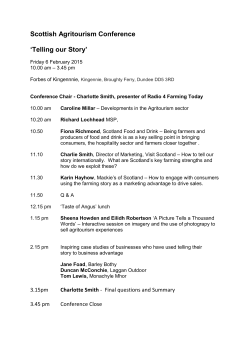
Notes of the A9 Safety Group meeting on 24 March 2015
A9 Safety Group Tuesday 24th March 2015 at 10:30 Birnam Arts and Conference Centre, Birnam Attendees: Alan Campbell BEAR Scotland Ltd John Smith BEAR Scotland Ltd Neil MacSporran Central Scotland Safety Camera Partnership Carron Tobin CH2M Hill Fairhurst JV Graeme Smith CH2M Hill Fairhurst JV Murdo Thomson CH2M Hill Fairhurst JV Margaret Simpson Freight Transport Association Neil Greig Institute of Advanced Motorists Dougie Bennion Northern Safety Camera Partnership Chic Haggart Perth & Kinross Council Ian Martin Police Scotland Chris Campbell Road Haulage Association Michael McDonnell Road Safety Scotland Fraser Grieve Scottish Council for Development & Industry David Buick Stagecoach Arron Duncan Tayside Safety Camera Partnership Hugh Logan The Highland Council Stewart Leggett Transport Scotland (Chair) Jamie Carson Transport Scotland David Pollock Transport Scotland David McConnell Transport Scotland Hugh Gillies Transport Scotland Graham Thomson Transport Scotland Notes of Meeting 1. Welcome & Introductions Stewart Leggett welcomed all to the meeting and introductions were made around the table. 2. Apologies Apologies had been received from a number of members prior to the meeting and where possible representation had been provided. Apologies from those members not represented at the meeting were received from George Mair (CPT-UK) and David Richardson (FSB). 3. Previous Minutes & Actions Stewart Leggett referred to the previously circulated minutes of the meeting held on the 3rd December 2014 and asked for any additional comments. There were no issues raised. The agreed Items for Action were discussed and where not closed were incorporated within the agenda items. Page 1 of 4 4. Website Development & Campaign Updates Jamie Carson provided an update on the A9 Road Info Website relating to its use during February and March 2015. The available data revealed that there have been over 6,500 sessions from more than 5,500 users, with over 13,000 pages viewed. Average time on the site is 1 minute 37 seconds. For 2015 to date there have been over 18,500 users with nearly 50,000 pages viewed. The release of performance data for average speed cameras on 26th January increased the use of the website. Current activities include a partial repeat of the overtaking campaign radio adverts prior to the Easter break which based on the previous campaign has a potential reach of 1.4 million adults. Content and timing of future campaigns were discussed with cognisance taken of the already agreed Road Safety Scotland National Campaign strategy. From this it was determined that a general driving behaviour campaign was most suitable allowing focus on a number of topical areas including speed limit awareness, close following, overtaking and fatigue. The campaign will be timed for mid-June to end of July to incorporate the busy summer period. The campaign will be supported by other activities carried out by members of the Group. This includes the Safety Camera Partnerships who will target hire companies with a focus on light goods vehicles where there is clear evidence of a lack of knowledge of national speed limits for this class of vehicle. The forthcoming change to HGV speed limits in England and Wales was discussed and it was emphasised that this had the potential of causing further uncertainty over the applicable speed limits for light goods vehicles. It was agreed that this reinforced the need for a focus on this issue within the campaign. The proposed campaign strategy when developed will be circulated to members for comment. The subject of foreign drivers was also discussed at some length and while this area will not be part of the forthcoming campaign as it is not solely related to the A9 it was confirmed that the Road Safety Scotland ‘Driving in Scotland’ leaflet is issued in several languages and available at recognised tourist outlets. 5. Average Speed Camera System (ASC) David McConnell provided a presentation based on the Key Performance Indicators agreed in relation to monitoring the performance of the route between Dunblane and Inverness following the introduction of the average speed camera system. The data and accompanying analysis was published on the A9 website on 26th January 2015. The key headlines from the data analysis are: The camera system detected 298 vehicles exceeding the speed limit which warranted further action, this is less than 4 per day. Overall speeding is down from around one in three drivers to one in twenty Examples of excessive speeding (10 mph+ above limit) are down by 97 per cent Journey times have increased in line with predictions Journey time reliability has improved There is no evidence that drivers are avoiding the A9 Feedback from hauliers suggests a significant reduction in journey times for HGVs The group were also updated that current trends showed that since the publication of the data the performance levels across the indicators had largely been maintained. The next data release is programmed for the end of April 2015. The only data not yet reported on relates to casualties and this is anticipated to be available late July covering the first six months of operation of the camera system. Reporting of casualty data has an established process for recording and validation and this is the earliest that figures will be available. Page 2 of 4 6. Road User Survey David McConnell provided a presentation on the findings of the A9 Road User Survey undertaken in April 2014 before ASC installation and repeated in February 2015 with 95% of the questions repeated in the surveys. The complete report is to be published on the A9 website immediately after the meeting. Taken as a whole, the results from the survey suggest: There has been a reduction in unsafe and undesirable driving, including users travelling at excessive speeds particularly 15 mph above the limit. Perceived enjoyment, satisfaction and safety have also all increased. It would be difficult to argue that since the introduction of ASCs there has not been a positive change in the behaviour of drivers and how safe they feel whilst travelling along the A9 even if it is difficult to ascertain whether this is down to the presence of ASCs, other factors or a mixture of both. When asked about the effects of average speed cameras: 70% agreed or strongly agreed that they felt safer than if the cameras were not in place 70% agreed or strongly agreed that they were less likely to exceed the speed limit 70% agreed or strongly agreed that they felt less likely to be involved in an accident Speed limit awareness was lower than during the initial survey but still higher than the AA national poll carried out in 2013. There followed a general discussion on this topic and it was agreed that although this was not a specific A9 issue that it should be one of the areas incorporated within the forthcoming campaign strategy. 7. Maintenance of the Route Alan Campbell provided an update on the Dunblane to Perth section confirming that a pedestrian survey was underway on A9 at Auchterarder following local desire to retain the temporary footbridge installed during the Ryder Cup. Other work planned over the next few months or recently completed includes additional signing on approach to Keir Roundabout, maintenance works at Balhaldie, Greenloaning, Aberuthven and resurfacing at Keir Wood. John Smith provided a short presentation on improvement and maintenance schemes between Perth and Inverness highlighting surfacing schemes completed at Ballinluig and currently underway at Dalwhinnie and Trinafour. North of Inverness there has been a recent surfacing scheme at Munlochy; footpath improvements, additional lighting and electronic pedestrian signing at Tore is currently underway. Bridge parapet replacements have also been completed at Allt Graad, Deephaven and underway at Kildary. New 30mph and replacement part-time 20mph electronic speed limit signs are being installed at Helmsdale and a replacement electronic junction warning sign at Rosskeen. A safety study investigation had been completed at Tain north junction with a signing and lining programme due for completion early summer. Further studies are also programmed for Latheron to Thurso and junctions at Munlochy, Dalmore and Tain south. 8. Update from Partners Dougie Bennion provided a presentation on the Northern Safety Camera Partnership strategy for the Inverness to Scrabster section of the route. The presentation included casualty rates, highest speeds and average number of offences per hour. He also updated that the high profile enforcement of the new 50mph Kessock Bridge speed limit has reduced offences from 23 per hour down to 4 per hour. Page 3 of 4 9. A9 Dualling Update David Pollock provided an update to the group on the A9 dualling programme. He confirmed that the Kincraig to Dalraddy section would be the first for construction and that the tender process was currently underway. He also updated that ground investigations works, necessary for the construction tender process have been completed for the Luncarty to Birnam section. However due to a number of objections lodged relative to this section a Public Inquiry will be necessary. However this process has been included in planned timescales. David Pollock introduced Murdo Thomson from CH2M Hill Fairhurst JV who are the Design Consultants for the central section of the dualling programme. Murdo presented details of the junction options available for accessing Dalwhinnie as part of the Dalwhinnie to Crubenmore section. The details within the presentation had also formed part of the public exhibition which took place in Dalwhinnie on 9th and 10th March to encourage local feedback. Following the presentation there was a broad discussion on operational issues with winter maintenance highlighted as a particularly important issue for the final design. Murdo emphasised the importance of receiving feedback from all partners on the design proposals and highlighted that the A9 dualling section of theTransport Scotland website provided this opportunity. Average Speed Camera Integration David McConnell confirmed that a temporary average speed camera system would be part of the speed management strategy for the dualling works. ASC has an established reputation for both reducing risk to road users and road workers as well as maximising traffic flow in major road works schemes. To provide consistency for the road user the existing A9 SPECS3 system will be used in conjunction with the SPECS Vector system which is the latest technology to receive Home Office Type Approval and is ideally suited for a road works environment. Both systems can be integrated and work seamlessly with the existing back office systems within the Safety Camera Partnerships. The speed limit appropriate to the works area will be assessed when the traffic management has been finalised and this will form part of the media and communications strategy for the works. 10. Future Initiatives Stewart Leggett asked members to consider and suggest future initiatives for the group to develop with an emphasis on casualty reduction measures. There was a short discussion on this topic with it being highlighted by Michael McDonnell that timing was equally important for such campaigns with the example of motorcycle casualties being highlighted. Road Safety Scotland are running an on-line motorcycle campaign from 9th April targeting aspects of rider behaviour with the Easter period identified as a period which sees a significant rise in this class of casualty. 11. AOCB Stewart Leggett reported that correspondence had been received from Birnam and Dunkeld Community Council for representation on A9 Safety Group. While representation had been declined Transport Scotland and BEAR Scotland are to engage with the Community Council to establish their particular issues and bring them back to the group if appropriate. 12. Date of Next Meeting Date of next meeting was proposed for 3rd week in June with the exact date to be confirmed in due course. Page 4 of 4
© Copyright 2025










